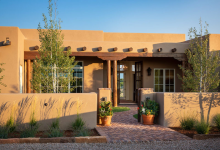I live in a cottage that was built around 1850, originally a humble two-up-two-down affair, now extended into 10 rooms by successive occupants. it now sits on 3 different levels, part of it has been knocked down and rebuilt from the original materials, the front porch is now the back porch, and vice versa. When we moved in 6 years ago we extended the room that the old front porch had become. Each set of occupants has subtly altered the house and you can read its history like a book. I'm currently looking at the census records from 1851 to 1921 and am learning a lot about our predecessors (I am not sure one or two of them aren't still here, in fact).
For many of my fellow Brits, the thought of that gives them the creeps and, like your average American, they seem to want a blank slate of a new house that is all them, and no one else. Well, each to their own.
At the other extreme, Mrs B and I work for a family that runs a farm on an estate which that same family has farmed since about 1260. The present manor house is only around 460 years old but it's huge and costs them a fortune to heat, so they live on a much smaller farmhouse on the estate and rent out the manor house to wealthy tourists. The farm buildings are mostly so old they can (and do) run the place as both a working farm and a museum. Now I love the old place and so does Mrs B - but we can always walk away from it any time we like - but they can't. They are held in place by centuries of tradition and hereditary responsibility and frankly, despite their social status they are asset-rich but cash-poor, and are more bound to where they are as any medieval villein. I wouldn't want to be them: but folk like that are not uncommon in Britain.










